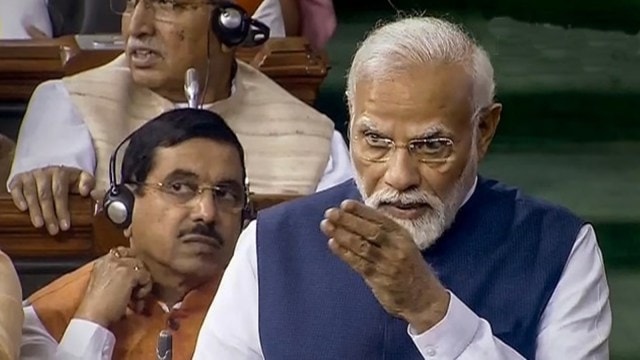
“The nation is not just land for us but an inspirational unit. When the foot is pricked by a thorn, the hand reaches out to extract it. It does not say it does not care about the foot… If one part of the body does not work, the whole body is considered disabled. If one part of the country is backward, the nation suffers. The nation has to be seen as a whole, not in parts,” he said.
“A national party thought of such things? What language is being used in the country today? Our tax, our money? Stop searching for new narratives to break the nation. We have to take the whole nation forward,” he said.
“If a Jharkhand boy gets an Olympic medal, do we think he is from Jharkhand? We say he is from our country. If we spend on that boy, it is for the country, not for Jharkhand. Will we ask in which state or city of the country a vaccine was made?” he said.
With the Congress losing out heavily in the north and surviving largely in southern states like Telangana, Karnataka and Kerala, Modi’s attack was at once an attempt to reach out to the south and to suggest to people in the north that the Congress was against their interests.
Additionally, the delimitation that has been proposed after the Census in 2026 is also likely to create unease in the south, as northern states will gain seats when delimitation happens as their population has grown more than that of the southern states, which had by and large seen their population stabilise around the 1970s. In this context, Modi is already adapting to the debate that is likely to happen in the future by emphasising that the nation needs to think as one whole and not in terms of states being gainers or losers.
Story continues below this ad
Seeking to underline his credentials as someone committed to federalism, he mounted another attack on the Congress.
“I have been lucky that I got a chance to serve as a Chief Minister for a long time. So, I understand regional aspirations. Digvijaya Singhji, Deve Gowdaji also understand it. For 10 years, the UPA government tried its level best to do injustice to Gujarat. I don’t cry over it. Yet, despite all those problems – I did not get appointments with ministers, who offered to talk on phone but not to meet me as CM, for fear that they may be seen with me on a video camera.”
“There was a natural calamity (in Gujarat). I requested the then Prime Minister (Manmohan Singh) to come. He decided to come. But then a committee met (and things changed). He had gone to the south, I don’t remember exactly which place. He said he would do a survey from his flight but not come (to Gujarat). I understand what might have happened,” he said. “So, my mantra is states’ development for the nation’s development. There is no disagreement on this. If a state takes one step, we will take two. The nation needs competitive, cooperative federalism.”
Recalling the cooperation between the Centre and states at the time of the Covid pandemic, Modi said, “Covid is an example. I had 30 meetings with CMs in those days. All states and the Centre worked as a team. We all worked to save the country. I don’t deny credit to anyone.”
Story continues below this ad
He mentioned that rather than holding major international events like the G20 Summit only in Delhi, he tried to disperse them across states.
“We could have organised the G20 Summit in Delhi. We organised 200 meetings in various states, and one in Delhi. It was done with a plan. We want to take the whole nation forward. When foreign dignitaries come, I request them to visit one state as well. I make it a point. My country is not just in Delhi, but also in Chennai, Bengaluru, Pune, Kolkata, etc. I want the whole world to know my India. I took the French President to Rajasthan so that the world knows what my Rajasthan is,” he said.
Modi commended the states for making the idea of aspirational districts successful: “Eighty per cent success (for aspirational districts) has come due to states and their officials. We want every part of the country to prosper,” he said.









